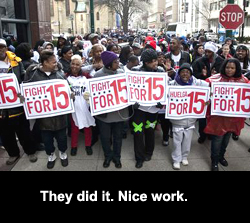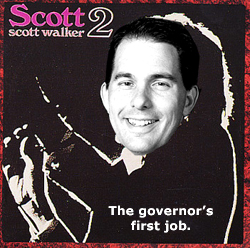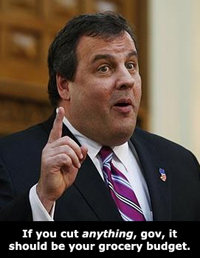Labor has been on the back foot for decades now. I am old enough to remember the Reagan turn – even the Carter and Nixon administrations, frankly. The serious move towards neoliberal economics got rolling under Carter, who was fond of deregulation and austerity. He also started a steady increase in military spending towards the end of his term – a trend that Reagan accelerated in the years that followed.
Those were not good years for workers. Firing the PATCO air traffic controllers was just a start. The union movement in the United States continued to lose ground throughout the 1980s and 1990s, when Clinton took the baton from Reagan/Bush and more fully implemented the vision of corporatism and a general attack on the rights of working people. There were a few glimmers of light in the darkness – the UPS strike in 1997, the anti globalization movement around the same time. But Thatcher’s contention that there was no alternative to capitalism continued to prevail. Until it didn’t.
Learning from teachers
We are now in the midst of a resurgence of labor organizing the likes of which we haven’t seen for decades. You could see evidence of it in some of the activism rooted in Occupy Wall Street, as well as the movement around Bernie Sanders’ campaigns. But what’s happening today is the product of a lot of hard work on the part of organizers across the country. One of the first and most dramatic examples of this was the start of the teacher’s strikes in 2018.
Now, I don’t think there are many professions in the United States that are more roundly abused than teachers. In most public school districts, they are given inadequate resources, paid poorly, and expected to compensate for all of society’s failings. When teachers rose up in 2018, including in districts that were not unionized, it put the neoliberals on notice. Even now, with the pitched attack against teaching children about race, sexual orientation, or anything salient in American history, teachers are still successfully challenging their bosses. There’s a lesson in that for all of us.
New economy, new tactics
Like many people, I first heard about Christian Smalls during the first months of COVID, when Amazon fired him for demanding that they take action to protect their workers. Over the almost two years that followed, he and his colleagues organized independently of any major unions and won. What they’ve done should serve as a blueprint for organizers across the country. That behemoth of a company drastically underestimated Smalls and his co-workers – not surprising. One of the oldest stories in the world.
Then there are the Starbucks workers. I heard some of these young people interviewed on Michael Moore’s Rumble podcast, and I was impressed not only with their energy and enthusiasm but by their deep understanding of the power relationship between workers and owners. This is more than inspiring, though. This movement is a promising sign of things to come, driven by a generation that has seen a lot of financial hardship over the last two decades.
Shake them upside-down
So what can we do? Support labor organizing in your area and nationwide, in whatever way you can. Push for a more favorable legal and regulatory environment in which people can exercise their fundamental rights as workers. And, last but not least, compel a reluctant Democratic party to change the tax laws so that billionaires cannot even exist. Call it the “shake them upside-down” law.
Finally … something to feel good about. Let’s build on it.
luv u,
jp


 High school standoff. Re this controversy about the standoff between Catholic anti-abortion protesters and Native Americans at the Lincoln Memorial this past weekend, I agree with Sam Seder that (1) young men can act like tremendous assholes when they gather in large numbers without proper supervision, and (2) where the hell were the supervising adults anyway, and how did they let this get so far out of hand? Despite all the hand wringing about misinterpreting the incident based on fragments of viral video, it’s obvious that these kids are mocking the Native Americans. I know that smirk anywhere. But I don’t blame them … just their minders, who shouldn’t be allowed to supervise children ever again.
High school standoff. Re this controversy about the standoff between Catholic anti-abortion protesters and Native Americans at the Lincoln Memorial this past weekend, I agree with Sam Seder that (1) young men can act like tremendous assholes when they gather in large numbers without proper supervision, and (2) where the hell were the supervising adults anyway, and how did they let this get so far out of hand? Despite all the hand wringing about misinterpreting the incident based on fragments of viral video, it’s obvious that these kids are mocking the Native Americans. I know that smirk anywhere. But I don’t blame them … just their minders, who shouldn’t be allowed to supervise children ever again. Frankly, it amazes me how cynical the resistance to a higher, inflation-indexed minimum wage truly is. Pegging the minimum at $7.25 was low enough in 2009; but the buying power of that wage has declined since then. Those who argue for leaving it where it is need to explain why they feel business should pay progressively less money for the same labor, year after year. (Am I the only one bothered by this?) Those who say that only teenagers looking for after-school work earn the minimum wage need to move into the current century. Those who feel raising the minimum wage gives earners more than they deserve, amounting to a kind of tax/entitlement, should be reminded that poor wage-earners rely more heavily on remaining forms of public assistance just to get by, such that we are all, in effect, subsidizing employers like Wal-Mart.
Frankly, it amazes me how cynical the resistance to a higher, inflation-indexed minimum wage truly is. Pegging the minimum at $7.25 was low enough in 2009; but the buying power of that wage has declined since then. Those who argue for leaving it where it is need to explain why they feel business should pay progressively less money for the same labor, year after year. (Am I the only one bothered by this?) Those who say that only teenagers looking for after-school work earn the minimum wage need to move into the current century. Those who feel raising the minimum wage gives earners more than they deserve, amounting to a kind of tax/entitlement, should be reminded that poor wage-earners rely more heavily on remaining forms of public assistance just to get by, such that we are all, in effect, subsidizing employers like Wal-Mart. When that happens, people inevitably look for someone to blame. Lately that someone has been unionized public employees. Sad to say, my fellow Americans are all too quick to think the worst of them. That’s not surprising. A lot of editorial ink, political rhetoric, and advertising resources have been placed against vilifying the very notion of working for government. It’s a waste of money, they’re a bunch of lazy layabouts who can’t make it in the private sector, etc., etc. For a long time that blanket criticism seemed confined to, say, the people down at the DMV, but in recent years it’s been expanded to teachers and even public safety employees.
When that happens, people inevitably look for someone to blame. Lately that someone has been unionized public employees. Sad to say, my fellow Americans are all too quick to think the worst of them. That’s not surprising. A lot of editorial ink, political rhetoric, and advertising resources have been placed against vilifying the very notion of working for government. It’s a waste of money, they’re a bunch of lazy layabouts who can’t make it in the private sector, etc., etc. For a long time that blanket criticism seemed confined to, say, the people down at the DMV, but in recent years it’s been expanded to teachers and even public safety employees. I have to say that my sentiments run along the same lines, though I’ve never worked as hard as my father did. Still… I understand what it is like, what many of the hidden costs of labor are, and that informs my perspective as well as that of many, many Americans. A vast majority of Americans, in fact, if recent polling is to be believed – Wisconsin Governor (and former pop star) Scott Walker and his peers in Indiana, Ohio, and elsewhere appear to have been working on the assumption that most people who do not belong to a union see no value in organized labor and have no knowledge of its history in this country. Evidently, they are mistaken. Polling has long shown that most American workers would, if given the opportunity, join a union. While they understand the necessity of making concessions from time to time, they do not agree that one should concede one’s basic rights. The right to collective bargaining was hard won, fought for. It will not be relinquished casually.
I have to say that my sentiments run along the same lines, though I’ve never worked as hard as my father did. Still… I understand what it is like, what many of the hidden costs of labor are, and that informs my perspective as well as that of many, many Americans. A vast majority of Americans, in fact, if recent polling is to be believed – Wisconsin Governor (and former pop star) Scott Walker and his peers in Indiana, Ohio, and elsewhere appear to have been working on the assumption that most people who do not belong to a union see no value in organized labor and have no knowledge of its history in this country. Evidently, they are mistaken. Polling has long shown that most American workers would, if given the opportunity, join a union. While they understand the necessity of making concessions from time to time, they do not agree that one should concede one’s basic rights. The right to collective bargaining was hard won, fought for. It will not be relinquished casually. I’ve heard many helpful suggestions about what we can do to help the Libyan rebels – everything from cat calls to military invasion. That last one worries me a bit. Frankly, I think the best thing western countries can do is just not buy oil from the regime, freeze assets, etc. We’ve floated him in much the same way that we support and have supported other despots in the region and elsewhere in the world, from Saddam Hussein in the 1980s to Hosni Mubarak three weeks ago. As always, it’s all about the money. What else would put him two seats down from Obama at an international conference? (Expect to see THAT picture during the 2012 campaign.)
I’ve heard many helpful suggestions about what we can do to help the Libyan rebels – everything from cat calls to military invasion. That last one worries me a bit. Frankly, I think the best thing western countries can do is just not buy oil from the regime, freeze assets, etc. We’ve floated him in much the same way that we support and have supported other despots in the region and elsewhere in the world, from Saddam Hussein in the 1980s to Hosni Mubarak three weeks ago. As always, it’s all about the money. What else would put him two seats down from Obama at an international conference? (Expect to see THAT picture during the 2012 campaign.) Fundamental economic disenfranchisement is a large part of what lit a fire under the people of Tunisia and Egypt. Remember that Egypt has, in the past few years, undergone a neoliberal economic restructuring that has exacerbated inequality beyond the miserable point at which it was before. I am not suggesting that Americans are facing this level of privation or repression. But the same process that concentrates wealth at the top in places like Egypt is at work right here at home. It’s not hard to see. Each recession takes a larger bite out of the working class and poor. This most recent one has been the worst in that respect, putting people out of work for months, years, and in some cases the rest of their lives, at least in terms of a solid, remunerative job that can support a family. Meanwhile, the wealthiest are top of the mast, as always, their income swelling to obscene levels, and the very investment bankers that crashed our economy two years ago are raking in the bonuses like never before.
Fundamental economic disenfranchisement is a large part of what lit a fire under the people of Tunisia and Egypt. Remember that Egypt has, in the past few years, undergone a neoliberal economic restructuring that has exacerbated inequality beyond the miserable point at which it was before. I am not suggesting that Americans are facing this level of privation or repression. But the same process that concentrates wealth at the top in places like Egypt is at work right here at home. It’s not hard to see. Each recession takes a larger bite out of the working class and poor. This most recent one has been the worst in that respect, putting people out of work for months, years, and in some cases the rest of their lives, at least in terms of a solid, remunerative job that can support a family. Meanwhile, the wealthiest are top of the mast, as always, their income swelling to obscene levels, and the very investment bankers that crashed our economy two years ago are raking in the bonuses like never before.